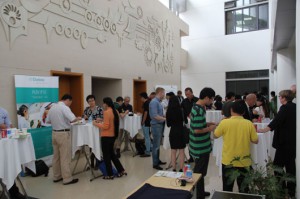Every third week in June is the National Food Safety Awareness Week in China. This year is the sixth consecutive year that China promotes understanding and consciousness regarding food safety at national and provincial/municipal level. Innovation Centre Denmark, Shanghai (ICDK) and Central Denmark Region had the pleasure of welcoming Danish researchers and companies within food safety to a four-day Food Safety Delegation to Shanghai on 17-20 June 2014.

The overall purpose of the delegation was to help Danish companies explore relevant application areas and possible further development of their technologies and solutions in China within the food sector, and the participating companies furthermore received important inputs to their business models. Additionally, Danish researchers within food safety had the opportunity to showcase Danish strongholds within microbiological food safety research, and to learn how Chinese researchers are working with food safety, mainly within traceability and mapping this sector.
“We haven’t had any previous China-experience in our Supply Chain Division, which is why this delegation was important to us. Our hunch about the conditions in the Chinese food safety sector, especially within chemical pollution of foodstuff and fraud, was confirmed, and this delegation provided us with in-depth knowledge about the current status and challenges”, says Henrik Bunkenborg, Chief Consultant from Lyngsoe Systems A/S.
Renewed political focus on food safety in China
This delegation came at a convenient time, as the new Chinese leadership has acknowledged the challenges China faces within food safety. The new Chinese Food Safety Law has recently been introduced, and the government has adapted food safety as an integral part of the 12th five-year plan. With these new governmental changes of ministerial responsibilities for food safety, the Chinese government is putting renewed political focus on the issue.
Nevertheless, a recent study shows a significant 29% increase from 2008 to 2012 in concerns about food safety. Corrupt officials and the gap between rich and poor is still issues the public is more concerned about but food safety concerns had the highest increase in in this four-year period making it the third major social concern in China. And this opportunity offers great potential for initiation of Sino-Danish technology and research collaboration and a unique platform to showcase Danish strongholds, which poses potential answers to China’s demand for sustainable solutions within food safety.
“From the delegation we learned that both the government, universities and companies are working hard to improve the situation but because of the country’s sheer size and lack of transparency in legislation China still faces challenges within food safety”, says Henrik Bunkenborg, Chief Consultant from Lyngsoe Systems A/S.
The major challenges in the Chinese food safety sector
The overall issues concerning the rapid development of the food safety sector in China is that that authorities and organisations ensuring control, regulation and traceability are having a hard time catching up with this development pace. There is no real aggregation in the food sector, with its more than 200 million farmers on an average 0,6 acres of land and more than half a million food processors, and the fragmented sector makes it hard to standardize training of people in how to handle and produce food. In general, there is a lack of data in the entire sector, and thus it is hard for stakeholders to get a complete overview over the sector. However, improvements have been made and the Chinese authorities are working on making less but clearer standards, and the Chinese government is trying to promote coordination and efficiency between the different authorities involved in the food sector, also in order to make it more foreseeable and easier to navigate. This poses opportunities for Danish stakeholders especially within traceability technologies and general advisory services within food safety, and because the Chinese authorities are relying on higher standards and methods, it also poses greater opportunities for Sino-Danish research collaboration.
Read more: Innovation Centre Denmark
